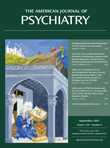“Frederick” (not his real name of course, but he is indeed the same Frederick who appeared in “A Tension to Detail” [March 2006]) distinguished himself by always being early for his appointments. He considered that to be an important aspect of showing respect. Sometimes he was as much as 3 hours early.
One afternoon, while strolling in the outpatient corridor waiting for his appointment, something exquisite caught his eye: the mother-of-pearl buttons he spotted on the blouse of a secretary through an open office door. Frederick stood just outside the door admiring the buttons for an interval that the secretary began to experience as uncomfortably long. Frederick meant no harm, as he later explained to me. No doubt, he reasoned, she too recognized the beauty of the buttons. Why else would she have purchased the blouse and worn it?
“Can I help you?” the secretary asked. “No thank you,” Frederick responded in his typical monotone, “I’m just enjoying your beautiful buttons,” at which he continued to stare. The secretary attempted to return to her work, but Frederick’s uninterrupted gaze made her too uncomfortable. So she buzzed her boss, Dr. Cohen, who came out of his office, quickly sized up the situation, and repeated the question. Frederick immediately realized he was in an unwanted confrontation with a hostile alpha-male. Frederick saw the dangerous weapon Dr. Cohen was brandishing in his right hand (a sharpened #2 yellow pencil, which Dr. Cohen, at that moment, was unaware that he was even holding), and Frederick was concerned that any sign of weakness on his own part could put him at great risk. He locked gaze with Dr. Cohen, not backing up an inch and not uttering a word, no matter what the psychiatrist facing him said. Fortunately, at that moment, our appointment time had come and I had walked out into the hallway, interrupting my patient’s mute and impervious standoff. Later, in my office, Frederick explained to me that the only way to deal with a savage beast is to show no fear, and putting up a brave front was therefore the only way he could defend himself. “Somebody can put your eye out with a pencil,” he observed.
Frederick was not angry at Dr. Cohen. He recognized the event as part of the natural “law of the jungle” in which we all live. But he still hoped that his own behavior could be more civilized and “above all that.” A year later, another event occurred that affirmed Frederick’s benign but easily misconstrued orientation.
It was Dr. Cohen’s first day back to work after having broken his ankle. He was standing near the waiting area, chatting with a hospital administrator (who was used to seeing Frederick there) and a senior female psychiatrist (who was not). Dr. Cohen was demonstrating the cumbersome wheeled ankle brace he needed to wear for ambulation when Frederick arrived. Frederick was fascinated by the device and moved to a position immediately adjacent to the circle of conversation where he could have the easy opportunity to watch and listen. After an awkward moment occasioned by Frederick’s uninvited proximity, Dr. Cohen attempted to deal with the situation in a welcoming and inclusive manner. “How do you like my new contraption?” he asked Frederick with a smile. “How would you like it if someone stabbed you in the eye with a pencil?” Frederick answered dispassionately, then turned and walked away toward my office. “Should we call security?” the female psychiatrist asked with genuine concern. “I do not think we need to,” Dr. Cohen responded, surprised by Frederick’s reply, but unperturbed. “He’s Sam’s patient. He’s here every week, and he will just sit and wait quietly for Sam now.”
Frederick told me all about the interaction when he came into my office. He explained how painful and constricting Dr. Cohen’s apparatus had appeared to be, and how it hurt Frederick just to look at it. He reflected that the very sight of it caused him pain, as if he had been stabbed in the eye to see it, and that he had told Dr. Cohen exactly this when Dr. Cohen had interrogated him about his emotional reaction. “It must be terrible to have to wear a thing like that all day,” Frederick continued. “Dr. Siris, I know it is not appropriate for me to do, but could you please send Dr. Cohen a get-well card to wish that he’s feeling better soon?”
I agreed. And then we settled back to our continuing work of helping Frederick find additional ways to be “above all that” by sublimating his own instinctual drives and to be more successful in life by having his own humanity less frequently misunderstood.

